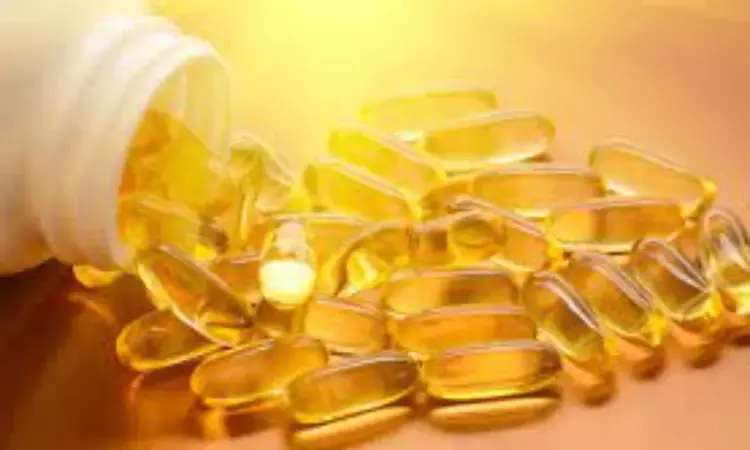- Home
- Medical news & Guidelines
- Anesthesiology
- Cardiology and CTVS
- Critical Care
- Dentistry
- Dermatology
- Diabetes and Endocrinology
- ENT
- Gastroenterology
- Medicine
- Nephrology
- Neurology
- Obstretics-Gynaecology
- Oncology
- Ophthalmology
- Orthopaedics
- Pediatrics-Neonatology
- Psychiatry
- Pulmonology
- Radiology
- Surgery
- Urology
- Laboratory Medicine
- Diet
- Nursing
- Paramedical
- Physiotherapy
- Health news
- Fact Check
- Bone Health Fact Check
- Brain Health Fact Check
- Cancer Related Fact Check
- Child Care Fact Check
- Dental and oral health fact check
- Diabetes and metabolic health fact check
- Diet and Nutrition Fact Check
- Eye and ENT Care Fact Check
- Fitness fact check
- Gut health fact check
- Heart health fact check
- Kidney health fact check
- Medical education fact check
- Men's health fact check
- Respiratory fact check
- Skin and hair care fact check
- Vaccine and Immunization fact check
- Women's health fact check
- AYUSH
- State News
- Andaman and Nicobar Islands
- Andhra Pradesh
- Arunachal Pradesh
- Assam
- Bihar
- Chandigarh
- Chattisgarh
- Dadra and Nagar Haveli
- Daman and Diu
- Delhi
- Goa
- Gujarat
- Haryana
- Himachal Pradesh
- Jammu & Kashmir
- Jharkhand
- Karnataka
- Kerala
- Ladakh
- Lakshadweep
- Madhya Pradesh
- Maharashtra
- Manipur
- Meghalaya
- Mizoram
- Nagaland
- Odisha
- Puducherry
- Punjab
- Rajasthan
- Sikkim
- Tamil Nadu
- Telangana
- Tripura
- Uttar Pradesh
- Uttrakhand
- West Bengal
- Medical Education
- Industry
Vitamin D supplementation fails to reduce multiple sclerosis activity after clinically isolated syndrome: Study

Australia: Vitamin D supplementation is safe and well-tolerated but failed to alter the multiple sclerosis (MS) disease activity and did not lower the risk of developing clinically definite MS in patients with high-risk clinically isolated syndrome, a recent study has shown.
In the double-blinded clinical trial published in Brain, the hazard ratios for conversion to clinically definite multiple sclerosis based on the vitamin D3 dose were 0.87 for 1000 IU, 1.37 for 5000 IU, and 1.28 for 10,000 IU compared with placebo.
Low serum 25-hydroxyvitamin D (25(OH)D) levels and low sunlight exposure are known risk factors for MS development. Therefore, Vitamin D supplementation is routinely recommended for patients with multiple sclerosis. However, no strong evidence exists supporting the role of vitamin D supplementation in reducing the progression rates or relapse rates among patients with MS.
To fill this knowledge gap, Bruce V Taylor, University of Tasmania, Hobart, Tasmania, Australia, and colleagues aimed to test the hypothesis that oral vitamin D3 supplementation in high-risk clinically isolated syndrome (abnormal MRI, at least three T2 brain and/or spinal cord lesions), delays time to conversion to definite multiple sclerosis, that all doses are safe and well tolerated, and that the therapeutic effect is dose-dependent.
For this purpose, they conducted a double-blind trial in New Zealand and Australia. Eligible participants were randomized in a ratio of 1:1:1:1 to placebo, 1000, 5000, or 10,000 IU of oral vitamin D3 daily within each study centre (n=23) and were followed for up to 48 weeks. Two hundred and four participants were enrolled between 2013 and 2021. Brain MRI scans were performed at baseline, 24 and 48 weeks.
The main outcome was conversion to clinically definite multiple sclerosis based on the 2010 McDonald criteria defined as either a clinical relapse or new brain MRI T2 lesion development.
The study led to the following findings:
- 199 cases were included in the intention-to-treat analysis based on the assigned dose. Of these, 116 converted to multiple sclerosis by 48 weeks (58%).
- Compared to placebo, the HRs for conversion were 1000 IU 0.87; 5000 IU 1.37; and 10 000 IU 1.28.
- In an adjusted model including sex, age, study centre, latitude, baseline symptom number, clinically isolated syndrome onset site, presence of infratentorial lesions, and steroids use, the HRs (versus placebo) were 1000 IU 0.80; 5000 IU 1.36; 10 000 IU 1.07.
- Vitamin D3 supplementation was safe and well tolerated.
"We did not demonstrate a reduction in MS disease activity by vitamin D3 supplementation after a high-risk clinically isolated syndrome," the researchers concluded.
Reference:
Butzkueven, H., Ponsonby, A., Stein, M. S., Lucas, R. M., Mason, D., Broadley, S., Kilpatrick, T., Barnett, M., Carroll, W., Mitchell, P., Hardy, T. A., Macdonell, R., McCombe, P., Lee, A., Kalincik, T., Lynch, C., Abernethy, D., Willoughby, E., Barkhof, F., . . . Investigators, P. Vitamin D did not reduce multiple sclerosis disease activity after a clinically isolated syndrome. Brain. https://doi.org/10.1093/brain/awad409
Dr Kamal Kant Kohli-MBBS, DTCD- a chest specialist with more than 30 years of practice and a flair for writing clinical articles, Dr Kamal Kant Kohli joined Medical Dialogues as a Chief Editor of Medical News. Besides writing articles, as an editor, he proofreads and verifies all the medical content published on Medical Dialogues including those coming from journals, studies,medical conferences,guidelines etc. Email: drkohli@medicaldialogues.in. Contact no. 011-43720751


